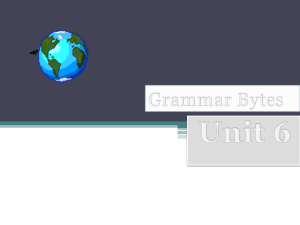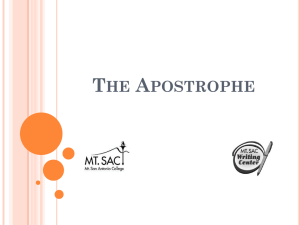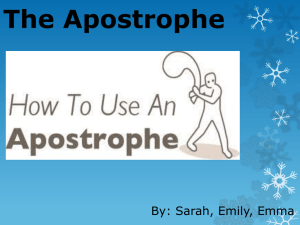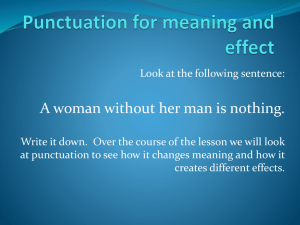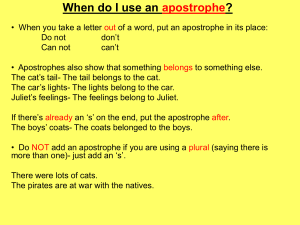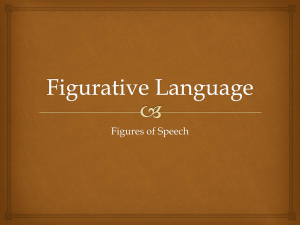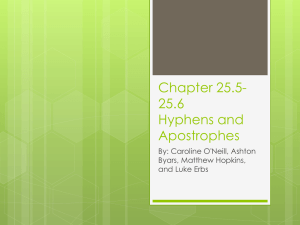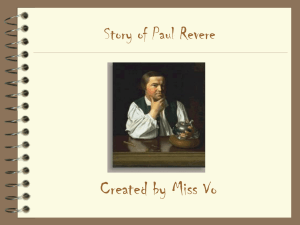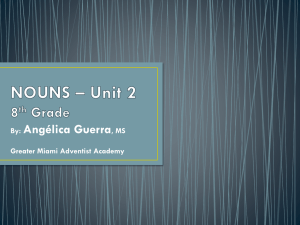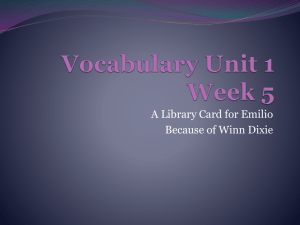Paul Revere
advertisement
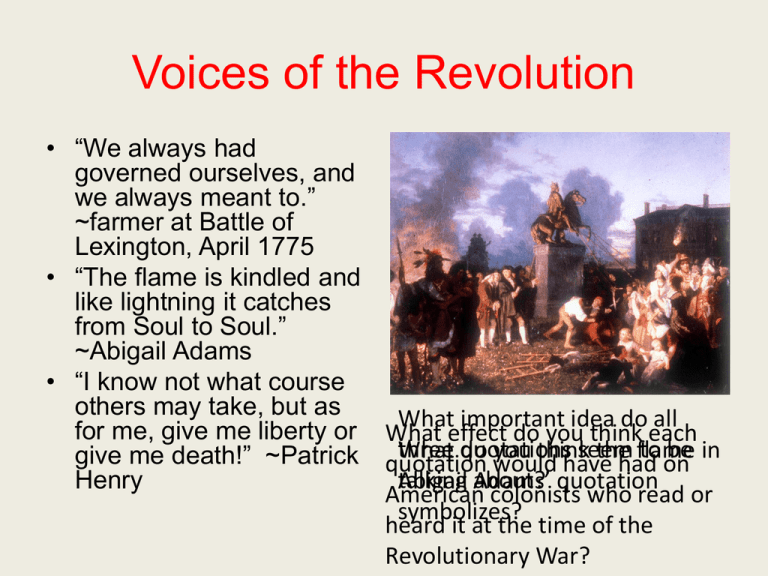
Voices of the Revolution • “We always had governed ourselves, and we always meant to.” ~farmer at Battle of Lexington, April 1775 • “The flame is kindled and like lightning it catches from Soul to Soul.” ~Abigail Adams • “I know not what course others may take, but as What important idea do all for me, give me liberty or What effect do you think each three quotations to be in What do you thinkseem the flame give me death!” ~Patrick quotation would have had on talking about? Abigail Adams’ quotation Henry American colonists who read or symbolizes? heard it at the time of the Revolutionary War? And Then What Happened, Paul Revere? • Author: Jean Fritz • Illustrator: Margot Tomes • Genre: Biography ~ a nonfiction selection based on Paul Revere’s life. Daily Schedules • • • • • Day 1 Day 2 Day 3 Day 4 Day 5 Day 1 Schedule • Reading – Vocabulary – Author’s Viewpoint – Read Segment 1 (262270) • Writing and Language – Daily Language Practice – Subject-Verb Agreement Review (285k; optional) • Word Work – Pretest (285g) Back to Paul Revere Vocabulary • cargo: the freight carried by a vehicle • colonies: territories governed by a parent country; the name for the 13 territories that became the original United States. • express: fast, direct, and often nonstop • liberty: the right to act as one chooses; freedom from the control of others • oppose: to act against something or someone • Patriot: a person who loves and defends his or her country; a colonist who was against British rule in the time of the Revolutionary War • revolutionary: of or tending to promote radical political or social change • sentries: soldiers who stand at watch for danger or for people without permission to pass • taxes: fees for the support of government required to be paid by people and businesses Vocabulary Practice: We will use vocabulary words where they best fit the context. 1. 2. 3. 4. 5. 6. 7. 8. 9. cargo colonies express liberty oppose Patriot revolution sentries taxes Fellow People of New England: Please come tonight at 8 P.M. to a very important meeting. As you well know, our is being threatened by the British government. Just today, we learned of new to be collected on tea. This is just the latest example of how King George III controls our lives through the arriving in Boston harbor each day. We the people of the must unite to fight against these wrongs. Each must show his or her willingness to defend the rights of Americans. If you the King’s actions, join us tonight so we can plan how to fight back. Tonight we may call for the to begin! Whatever we decide, our plan will be spread throughout the colonies by riders on the fastest horses available. Please note that will stand guard outside the meeting to warn us if British soldiers come near the meeting hall. Back to Day 1 Schedule Author’s Viewpoint We will identify the author’s viewpoint. Prior Knowledge • Share with your partner how you feel about soccer. • This is your viewpoint on the subject of soccer. • Not everyone has the same viewpoint on soccer. Concept • Viewpoint: how one feels about a topic, or one’s thoughts on a topic. Importance • Identifying the author’s viewpoint helps a reader understand why the author is interested in the subject and how the author thinks. • Read the last paragraph on page 263. Skill 1. 2. 3. 4. Think about the facts and opinions in the selection. What type of language does the author use? (positive or negative) What is the author’s purpose: to entertain, to inform, or to explain? Combine the evidence from the text with your own knowledge to make an inference about the author’s viewpoint 1) The author is giving her opinion that Paul Revere is one of the busiest people in Boston. 2) The language she uses –the way she repeats the word more- makes me think she really admires his busy life. 3) I think her purpose for writing this book is both to entertain and to inform the reader. 4) From all these clues I think that her viewpoint about Paul Revere is that she admires him. Skill 1. 2. 3. 4. Think about the facts and opinions in the selection. What type of language does the author use? (positive or negative) What is the author’s purpose: to entertain, to inform, or to explain? Combine the evidence from the text with your own knowledge to make an inference about the author’s viewpoint • We do: Read the first paragraph on page 264 (open practice books to page 140) 1) What opinion can you find? “In Boston there was always plenty to see” 2) Is the language positive or negative? Positive 3) What is the author’s purpose? To entertain and to inform 4) What viewpoint is revealed? The author seems to think Boston was a very interesting place to be. Author’s Viewpoint Closure • What word means, “how one feels about a topic”? • What 3 things do we look at to identify the author’s viewpoint? • Read the last paragraph on page 142 of your practice book. What is the author’s viewpoint on Benedict Arnold? Practice • Guided Practice – As we read, we will continue filling in the chart on practice book pg. 140 • Independent Practice – Later in the week, we will complete practice book pages 142-143 Back to Day 1 Schedule Daily Language Practice We will proofread and correct sentences with spelling and grammar errors. • Daves dream is to become an acter. • Is the dog barking at a bergler • There was thunnder and lightning in washington today. Back to Day 1 Schedule Day 2 Schedule • Reading – Segment 2 (271-278) – Author’s Viewpoint • Practice book pg. 140 • Writing and Language – Daily Language Practice – Grammar • Practice book pg. 149 – Comprehension questions (280) • Practice book pg. 141 – Vocabulary • Practice book pg. 139 • Word Work – Possessives and Contractions – Spelling • Practice book pg. 145 Back to Daily Schedules Possessives and Contractions Objective: We will identify and interpret possessives and contractions Concept • Apostrophe ( ‘ ): a symbol that takes the place of letters in a contraction; it can also be used to show possession. • Possessive (‘s or s’): indicates ownership – Paul Revere’s horse = the horse belonging to Paul Revere • Contraction: two words put together in which letters have been left out – He is = he’s Importance • Identifying when a contraction or possessive is being used will increase your reading comprehension. • I do: Skill 1. Highlight the apostrophe and the letters following it. 2. Is the apostrophe replacing missing letters? 1. It is a contraction 3. Is there a noun immediately following the word with the apostrophe? 1. It is a possessive – a man’s pet squirrel • Is the apostrophe replacing letters? – No • Is there a noun immediately following the word with the apostrophe? – Yes • It is a possessive meaning the pet squirrel belongs to the man – they’d like to get back • Is the apostrophe replacing letters? – Yes • It is a contraction for they would • We do: – that’s what he did Skill 1. Highlight the apostrophe and the letters following it. 2. Is the apostrophe replacing missing letters? 1. It is a contraction 3. Is there a noun immediately following the word with the apostrophe? 1. It is a possessive • Is the apostrophe replacing letters? Yes • It is a contraction for that is – printer’s colors • Is the apostrophe replacing letters? No • Is there a noun immediately following the apostrophe word? Yes • It is a possessive meaning the colors belonging to the printer • You do: – Paul’s spurs Skill 1. Highlight the apostrophe and the letters following it. 2. Is the apostrophe replacing missing letters? 1. It is a contraction 3. Is there a noun immediately following the word with the apostrophe? 1. It is a possessive • Possessive meaning the spurs belonging to Paul – this wasn’t enough • Contraction meaning was not Closure • What word means, “a symbol which shows possession”? • What word means, “belonging to”? • Is Revere’s dog a possessive or a contraction? • Independent Practice – Practice book pg. 144 – How do you know? – What does it mean? Back to Day 2 Schedule Daily Language Practice • She need a mirrore to check her contact lenses. • the mayer declared today a holiday. • Suzy and Li climbs on the trackter. Back to Day 2 Schedule Day 3 Schedule • Reading – Partner Read – Author’s Viewpoint • Practice book pg. 142-143 • Writing and Language – Daily Language Practice – Writing a Character Sketch • Word Work – Greek root anti – Spelling • Practice book pg. 146 Back to Daily Schedule Greek Root anti objective: we will analyze the meaning of anti, and generate a list of words with this root. Concept • Anti: a Greek root meaning “against, or opposed to” • Example: – The doctor gave me an antibiotic to help fight off my infection. – Antibiotic means “against harmful organisms” Importance Recognizing word roots can help you figure out the meaning of words you do not recognize. Greek Root anti Skill • Highlight the word root. • Look at the remainder of the word • What does it mean • Use context clues to help define the word. Practice • I do – The end of the story was anticlimactic, it really let me down. • We do – Andy is very antisocial, he is always hanging out by himself. • You do – I put antifreeze in my car’s battery to help it start in the morning. Closure • What root means “against or opposed to”? • How do we determine the meaning of a word containing a Greek/Latin root? • Which word means “against poison”? a) antitrust b) antitoxin • Independent Practice – What other words can you think of containing anti? – What do each of these words mean? Back to Day 3 Schedule Daily Language Practice • My brothers job is to hang the bannar. • The goats eats clovor all summer. Back to Day 3 Schedule Writing a Character Sketch We will write a character sketch. Prior Knowledge • Tell your partner about your best friend. • If you were to write this description, it would be called a character sketch. Concept • Character sketch: a written profile that gives a colorful and vivid picture of what a real person or character is like. • Example: the author of “And Then What Happened, Paul Revere?” wove many colorful and interesting details about Paul Revere’s character, life, family, daily activities, and heroic actions. Skill 1. 2. 3. 4. 5. 6. Choose a real person or a story character to write about. Brainstorm details about how the person looks, acts, thinks, and feels. Open with a quote or an anecdote (short story) about the character. Write a sentence that sums up the person’s most significant character traits. Include several details that support your summary of the person’s traits. End with a conclusion that sums up the person’s significant traits. Very active Confident, daring, heroic Paul Revere Quick thinking, fast acting, brave Many careers, children, activities Conclusion • What do you call a piece of writing that gives a picture of what a real person or story character is like? • What type of information should be included in a character sketch? • Independent practice: – Use practice book pg. 152 to brainstorm your character. – Write a 1-2 paragraph character sketch Back to Day 3 Schedule Day 4 Schedule • Reading – “Yankee Doodle” (282285) • Word Work • Writing and Language – Daily Language Practice – Grammar • Practice book pg. 150 – Spelling • Practice book pg. 147 – Synonyms Back to Daily Schedules Synonyms We will identify synonyms. Activate Prior Knowledge • What is another word for happy? • When you think of words that mean nearly the same thing, you are identifying synonyms. Concept • Synonyms: words with the same, or nearly the same, meaning. • Importance: Writers often use synonyms to avoid repeating words, and to keep their writing fresh and interesting. • I do Skill 1. 2. Use context clues to determine the meaning of the word. Think of other words that have the same, or nearly the same, meaning. – Instead he patrolled the streets at night, delivered his messages to Philadelphia, and kept himself ready at all times. • Patrolled: watched • Delivered: carried • Ready: prepared • We do – He felt uneasy to be on a moonlit road on foot. • Uneasy: nervous, scared • Road: path, trail • You do – Sometimes he was in such a hurry that his writing looked sloppy. • Hurry: rush • Sloppy: messy Closure • What do we call two words that are similar in meaning? • How do we identify synonyms for a given word? • What is a synonym for the underlined word? – Paul found that money could be made in many ways. a) b) c) d) arrived dragged earned discovered Back to Day 4 Schedule Daily Language Practice • We each found a quarter under our desks? • What is the mater with ethan today? Back to Day 4 Schedule Day 5 Schedule • Reading – Comprehension Test – Vocabulary Test • Writing and Language – Practice book pg. 151 • Word Work – Spelling Test Back to Daily Schedules
